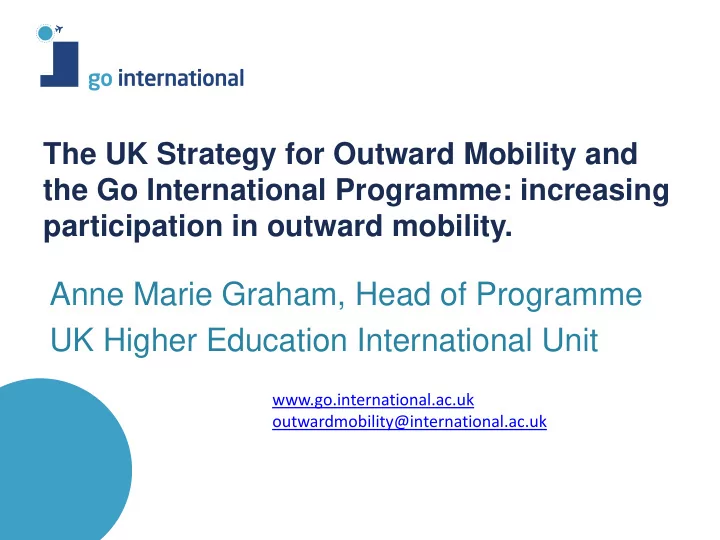

The UK Strategy for Outward Mobility and the Go International Programme: increasing participation in outward mobility. Anne Marie Graham, Head of Programme UK Higher Education International Unit www.go.international.ac.uk outwardmobility@international.ac.uk
www.go.international.ac.uk Aim: to increase the proportion of UK domiciled students accessing international experience as part of their higher education
How mobile are our students? 22,100 UK domiciled mobile students = 1.2% UK domiciled students Total number of mobile students in 2013/14 by domicile
Who goes abroad? Socioeconomic Background Activity lower four SEC codes Study top four SEC codes Work Volunteering 74% 84% Level of study Language mobilities UG Language PGR student mobilities 31% PGT 69% Other UG 96% Non-language student mobilities
Where do they go? Top 10 destinations: In Europe Outside Europe France: 4,230 USA: 2,680 Spain: 3,270 Australia: 1,185 Germany: 1,960 Canada: 940 Italy: 1,065 China: 660 Netherlands: 655 Malaysia: 335 Russia: 370 Japan: 320 Sweden: 335 Hong Kong SAR: 310 Belgium: 275 New Zealand: 255 Ireland: 270 India: 185 Austria: 245 South Africa: 180
What do academics think? Surveyed 56 staff in 30 institutions; conducted 14 in-depth interviews Asked for their views on benefits and barriers of mobility Academics report that: • Increase in number of outwardly mobile non-language students, but language skills still limiting participation • Limited participation partly due to students’ lack of knowledge of language support on offer • Staff from institutions taking strategic approach to language support reported a positive impact on mobility e.g. making ‘Language for All’ modules available to all students and promoting them widely
How does language affect mobility? Surveyed 2,842 students in 37 institutions Asked for their views on benefits and barriers of mobility • Language found to be: – A commonly reported motivation (varied strongly with subject – language degrees) – An important factor in decision-making – The 4 th biggest perceived barrier to mobility – A perceived impact (both positive and negative). • Language students more likely to be on compulsory study abroad/work placements than other subjects.
How does mobility affect language proficiency?
What are mobile student outcomes? Cohort study Comparison of mobile vs non-mobile students Mobile students in this cohort: - Were less likely to be unemployed - Had higher starting salaries - Were more likely to enter employment in more senior roles - Were more likely to graduate with a 1 st or 2:1
Gone International key findings – employment outcomes Overall, a lower proportion of non- language graduates who were mobile were unemployed. And there were also significant differences for other student profiles
Mobility-inspired language learning ‘My experience did not require language skills and before I went away I had not considered learning another language. Whilst I was away, I lived in an international house with students from all over the world, many of which could speak 3 or 4 languages. This experience made me realise that learning another language would expand my opportunities even further and upon returning to the UK I have Rosie Willis, started taking Spanish classes and plan to spend time in South MSci Mathematics, America in the upcoming year to improve my language skills .’ King’s College London ‘It can be hard to get around on a day-to- Team Tan, day basis if you don’t speak any Korean BSc International and frustrating at times.” Team took Management, Korean language classes, and they helped The University of Warwick a lot. “It's good to pick up some basic Korean to get by on a day-to-day basis .’
Recommend
More recommend